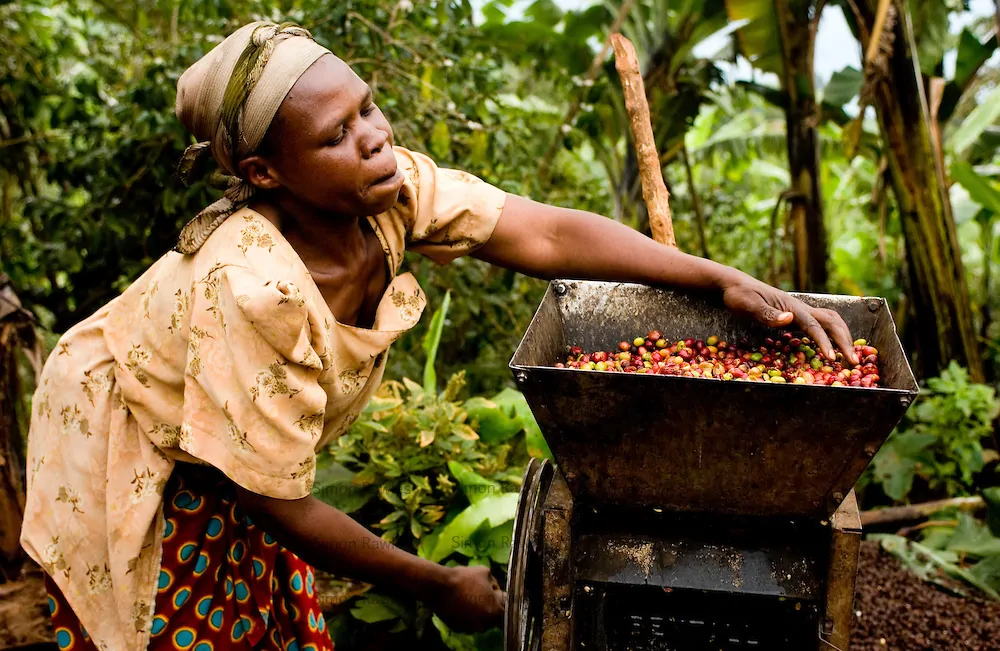The pain of Uganda’s coffee farmers as prices plunge

Without price protection, they warn, Uganda’s farmers face an increasingly uncertain future
In Uganda’s hills and plains, where coffee has long been the lifeline of families and entire communities, a quiet storm is brewing – one tearing through livelihoods and threatening the country’s revenue streams.
For many years, coffee has been Uganda’s pride, sustaining the hopes of 1.8 million farming households. In good seasons, farmers saw the fruits of their labour fetch millions of shillings, rewarding their rugged hands and efforts, and earning the country over $2.08 billion from overseas markets, according to last year’s records.
Uganda harvested 7.43 million bags, ranrking among the top coffee producers in the world. In May 2025, Uganda surpassed Ethiopia, becoming Africa’s top coffee exporter.
This triumph was built on the backs of farmers who replanted their fields with resilient coffee trees, nurtured them like family, and endured droughts and pests. With new seedlings and renewed hope, they turned 610,000 hectares into coffee plantations.
Within just a month, the price of a kilogram of Robusta coffee fell from $3.90 in early April to $2.22. For ordinary farmers, tough times loom: unpaid school fees, skipped meals, medical bills unmet, and mounting loan repayments.
The latest crisis in the coffee industry, which has halved the farm-gate prices of red fresh cherries, has cast a dark cloud over the sector’s future.
Hakim Bananuka, a smallholder farmer in Kisukunyi village, Kigarama Parish, Ndeija Sub-county in Rwampara District, western Uganda, says he borrowed money from lenders to expand his plantation when the farm-gate price stood between $0.83 and $0.41 per kilogram.
Now, at just $0.41 per kilo for green beans/cherries, farmers like Bananuka are staring at massive losses and questioning the long-held Ugandan adage “Emwanyi telimba” – meaning “coffee doesn’t lie or disappoint” – once a rallying call to grow more coffee. But the crop now seems to be telling a different story.“Imagine spending Ush2,000 ($0.55) to produce one kilogram of red coffee cherries, yet the market only offers Ush1,000 ($0.27),” said Bananuka.“I see many farmers unable to service their loans. The average global price for Uganda’s coffee has been steadily declining – from highs of Ush18,462 ($5.15) per kilo in April to Ush17,066 ($4.76) in June,” he added.
Ugandan exporters blame the growing global supply of beans. For instance, on July 26, 2025, Robusta futures on the London exchange fell by 3.61 percent to $3,228 per tonne, while Arabica futures on the New York exchange declined by 2.39 percent to £297.55.
This drop comes amid increased harvests from Brazil and Indonesia. By 23 July, Brazil had harvested 84 percent of its 2025/26 crop (Tridge, July 26, 2025).
The fluctuations have forced many farmer cooperatives like the Bugisu Cooperative Union (BCU) to adopt a wait-and-see approach.“In the Bugisu sub-region, it’s off-season,” said Barbara Wasagali, BCU’s General Manager. She explained that the union – which controls the biggest share of the market – had already sold most of the two million kilos of coffee bought this season to contract buyers with orders extending to September.
BCU, Uganda’s leading Arabica coffee trading entity, is monitoring the situation closely.“We are watching the market. Global prices will inform what price the union offers farmers,” said Wasagali, assuring competitive rates to the union’s farmer members.
Julius Tugume, a member of the Banyankole Kweterana Cooperative Union in western Uganda and a coffee consolidator, said the price drop has rattled businesses.
Many middlemen purchased coffee at between Ush9,465 ($2.64) and Ush9,968 ($2.78) per kilo from farmers, expecting to resell at Ush15,955 ($4.45). With shrinking margins, Tugume fears widespread loan defaults throughout the value chain.
The bottoming out of coffee prices has also stirred political concerns, particularly in the central region, which strongly opposed the recent rationalisation of the Uganda Coffee Development Authority (UCDA).“We warned the government against rationalising UCDA,” said Muwanga Kivumbi, MP for Butambala County, about 50 km west of Kampala. “Such a move denies this vital crop the specialised attention it deserves.”UCDA was folded into the Ministry of Agriculture under the Rationalisation of Government Agencies and Public Expenditure (Rapex) policy, aimed at merging agencies to reduce redundancy, duplication, and costs.“Coffee is a vital crop,” Kivumbi added. “But the big-headed majority in Parliament pushed through UCDA’s rationalisation.”In Buganda, coffee is a deeply cultural commodity. Visitors are served coffee cherries as a sign of bonding; beans are gifted at weddings and featured in traditional oaths of brotherhood. UCDA had successfully positioned Uganda as Africa’s top coffee exporter by volume, displacing Ethiopia in May – a title Ethiopia had held for decades.
Agriculture Minister Frank Tumwebaze insists there is no cause for alarm. September marks a seasonal shift for Brazil, which accounts for 39 percent of global coffee output.“Brazil and Vietnam are nearing the end of their main harvests,” said Tumwebaze, noting that favourable weather had increased Brazil’s Robusta supply, exerting downward pressure on global prices.
Still, the minister maintains that global Arabica prices have stabilised the sector for farmers and traders in Uganda’s Elgon, Kigezi and Rwenzori highlands.“The current price range is not alarming,” Tumwebaze said. “We are not producing coffee at a loss. In fact, prices have appreciated this month. Even with fluctuations, farmers are still getting value.”Uganda’s coffee replanting programme – encouraging farmers to cut old trees and plant high-yield, drought- and disease-resistant varieties – has boosted production. Over 47.2 million seedlings were distributed to 60,392 farmers with average landholdings of 2.8 hectares and expected yields of 1.5 kg per tree.
An anticipated glut on the global market has depressed prices, threatening the livelihoods of 4.12 million smallholder farmers across EAC coffee-producing countries – Burundi, Uganda, Kenya, Tanzania, and Rwanda.
Against this backdrop, some Members of Parliament are calling on the government to set a minimum coffee price to reassure farmers and cushion them from severe losses.
Without price protection, they warn, Uganda’s farmers face an increasingly uncertain future.
Source : ZAWYA





